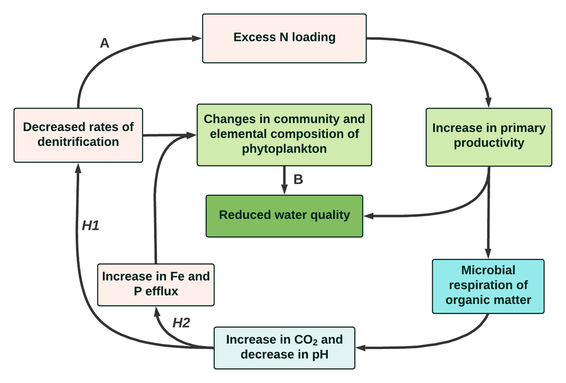Forecasting rates of sediment nutrient and metal fluxes under coastal acidification for improved estuarine water quality
|
Coastal acidification refers to the reduction in pH of coastal waters. Unlike the open ocean, coastal acidification is driven by excess nitrogen (N). This N fuels primary productivity and the subsequent decomposition of this organic matter lowers estuarine pH. In fact, estuaries experience pH shifts of ≥ 0.5 daily. Thus, estuaries are natural laboratories in which to study how acidification alters fundamental ecosystem processes such as nutrient filtration and cycling. The purpose of this research is to determine the impact of coastal acidification on sediment N, phosphorus (P), and iron (Fe) cycling. To address this issue, we will experimentally manipulate pH in the overlying water column of sediment cores collected from Waquoit Bay, MA. Using continuous flow through incubations, we will quantify rates of sediment denitrification (microbial removal of N to di-nitrogen gas), N, P and Fe fluxes. We will use these findings and data from the WBNERR System-Wide Monitoring Program to develop a model that will predict the impact of low pH conditions on these fluxes and future water quality in Waquoit Bay. This study will be a crucial link to understanding how coastal acidification alters total ecosystem productivity, biogeochemical cycling and water quality.
Objectives:
|

We hypothesize lower pH will decrease rates of denitrification (i.e., N removal; H1) and increase Fe and P efflux from sediments (H2). This increase in nutrients and metals will increase rates in nutrient loading, thus primary productivity (A), and will change community and elemental composition of phytoplankton resulting in further reduced water quality (B).
|
Media
|
|
|
Presentations
- Mazur, Claudia: Forecasting rates of sediment nutrient and metal fluxes under coastal acidification for improved estuarine water quality. National Estuarine Research Reserve Annual Meeting. Seattle, WA. Fall 2020. Virtual Poster.
- Mazur, Claudia: Bringing to Light the Impacts of Coastal Acidification on Water Quality. Friends of the Waquoit Bay Reserve. Mashpee, MA. Fall 2020. Virtual Talk.
Outreach
Step into STEM is an initiative of the Waquoit Bay National Estuarine Research Reserve in collaboration with the Margaret A. Davidson Graduate Fellowship and is supported by the NOAA for Minority Student STEM Initiative. The purpose of this program is to provide first generation high school and college students the opportunity to join a supportive network of students with shared interests and to meet first generation scientists. Workshops topics include:
- How to Apply to College
- How to Write a Resume and Personal Statements
- Making the Most of College
- STEM Career Panel
To learn more about the Margaret A. Davidson Graduate Fellowship check out the website. Calls for the 2022-2024 cohort will be available Summer 2021.



